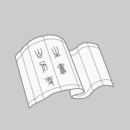
Elegies of Chu Nicholas Morrow Williams 楚辞 牛津世界经典系列 英文原版
¥ 126 8.0折 ¥ 157 九五品
库存2件
广东广州
认证卖家担保交易快速发货售后保障
作者Nicholas Morrow Williams
出版社Oxford University
ISBN9780198818311
出版时间2022-01
印刷时间2022-01
印数1千册
装帧平装
纸张轻型纸
页数336页
字数1千字
定价157元
上书时间2024-09-12
- 最新上架
商品详情
- 品相描述:九五品
- 商品描述
-
基本信息
Format Paperback | 336 pages
Dimensions 130 x 195 x 15mm | 232g
Publication date 01 May 2022
Publisher Oxford University Press
Language English
ISBN10 0198818319
ISBN13 9780198818311
页面参数仅供参考,具体以实物为准
书籍简介
《楚辞》是现存的两部中国古代诗歌集之一,是整个中国诗歌传统的一个重要来源。由于挽歌中包含了对政治抗议的热情表达,以及萨满教的魔咒和游魂主题,它们呈现了早期中国文化的另一种面貌;一种与正统儒家思想不一致的面貌。本译本采用了文学性的英语手段
以强调这些中国诗歌的原始结构。它还研究了源文本中异常生动的措辞,包括拟声词、华丽的描述、奇异的花朵、戏剧性的风景、隐喻和惊人的比喻。
该译本将以汉代王逸(公元2世纪)编纂的原始文集为基础,包含从公元前3世纪到汉代收集的部分诗歌。该选集使读者了解中国文学及其从自由奔放的神话歌曲到汉代宫廷的更正式、更精炼的风格的演变。
Elegies of Chu (in Chinese, Chuci), one of the two surviving collections of ancient Chinese poetry, is a key source for the whole tradition of Chinese poetry. Because the elegies contain passionate expressions of political protest as well as shamanistic themes of magic spells and wandering spirits, they present an alternative face of early Chinese culture; one that does not align with orthodox Confucianism. This translation employs literary English devices
in order to emphasise the original structure of these Chinese poems. It also examines the extraordinarily vivid diction of the source texts, including of onomatopoeia, ornate descriptions, exotic flowers, dramatic landscapes, metaphors and startling similes.
This translation will be based on the original anthology compiled in the Han dynasty by Wang Yi (2nd century CE), and contains a selection of poems that were collected from the 3rd century BCE through the Han dynasty. The anthology provides readers with an understanding of Chinese literature and its evolution from free-spirited, mythico-religious songs to the more formal, polished style of the Han court.
作者简介
Nicholas Morrow Williams是HK大学中文学院的副教授,也是《唐研究》的编辑。他在比较文学、、中日文化互动、翻译研究、思想史和其他领域研究和翻译中国古典诗词。
Nicholas Morrow Williams is Associate Professor in the School of Chinese of the University of Hong Kong and editor of Tang Studies. He studies and translates classical Chinese poetry both for its own sake and in the contexts of comparative literature, Buddhist studies, Sino-Japanese cultural interactions, translation studies, intellectual history, and other fields. His research increasingly concerns the role of Buddhism in the development of Chinese literature and culture.
— 没有更多了 —



















以下为对购买帮助不大的评价